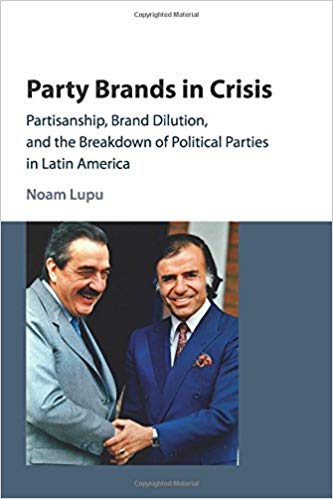
| Judul | Party Brands in Crisis : Partisanship, Brand Dilution, and the Breakdown of Political Parties in Latin America / Noam Lupu |
| Pengarang | Lupu, Noam |
| EDISI | Cet. 2 |
| Penerbitan | Cambridge : Cambridge University Press, 2017 |
| Deskripsi Fisik | xv, 247 p. :: illus. ;24 cm. |
| ISBN | 978-1-107-07360-9 |
| Subjek | Political Parties--Latin America Party Affiliation--Latin America Party Dicipline--Latin America |
| Abstrak | Party Brands in Crisis offers an explanation that highlights the effect of elite actions on voter behavior. During the 1980s and 1990s, political elites across the region implemented policies inconsistent with the traditional positions of their party, provoked internal party conflicts, and formed strange-bedfellow alliances with traditional rivals. These actions diluted party brands and eroded voter attachment. Without the assured support of a partisan base, parties became more susceptible to short-term retrospective voting, and voters without party attachments deserted incumbent parties when they performed poorly. Party Brands in Crisis offers the first general explanation of party breakdown in Latin America, reinforcing the interaction between elite behavior and mass attitudes. |
| Bahasa | Inggris |
| Bentuk Karya | Tidak ada kode yang sesuai |
| Target Pembaca | Tidak ada kode yang sesuai |
| No Barcode | No. Panggil | Akses | Lokasi | Ketersediaan |
|---|---|---|---|---|
| 00000026491 | 324.2 LUP p | Dapat dipinjam | Perpustakaan Lantai 3 - Mahkamah Konstitusi RI | Tersedia
pesan |
| Tag | Ind1 | Ind2 | Isi |
| 001 | INLIS000000000009631 | ||
| 005 | 20221024095025 | ||
| 008 | 221024################|##########|#eng## | ||
| 020 | # | # | $a 978-1-107-07360-9 |
| 035 | # | # | $a 0010-0520009631 |
| 041 | $a eng | ||
| 082 | # | # | $a 324.2 |
| 084 | # | # | $a 324.2 LUP p |
| 100 | 0 | # | $a Lupu, Noam |
| 245 | 1 | # | $a Party Brands in Crisis : Partisanship, Brand Dilution, and the Breakdown of Political Parties in Latin America /$c Noam Lupu |
| 250 | # | # | $a Cet. 2 |
| 260 | # | # | $a Cambridge :$b Cambridge University Press,$c 2017 |
| 300 | # | # | $a xv, 247 p. : $b : illus. ; $c 24 cm. |
| 520 | # | # | $a Party Brands in Crisis offers an explanation that highlights the effect of elite actions on voter behavior. During the 1980s and 1990s, political elites across the region implemented policies inconsistent with the traditional positions of their party, provoked internal party conflicts, and formed strange-bedfellow alliances with traditional rivals. These actions diluted party brands and eroded voter attachment. Without the assured support of a partisan base, parties became more susceptible to short-term retrospective voting, and voters without party attachments deserted incumbent parties when they performed poorly. Party Brands in Crisis offers the first general explanation of party breakdown in Latin America, reinforcing the interaction between elite behavior and mass attitudes. |
| 650 | 4 | $a Party Affiliation--Latin America | |
| 650 | 4 | $a Party Dicipline--Latin America | |
| 650 | 4 | $a Political Parties--Latin America | |
| 990 | # | # | $a 26491/MKRI-P/XII-2018 |
| 990 | # | # | $a 26491/MKRI-P/XII-2018 |
Content Unduh katalog
Karya Terkait :